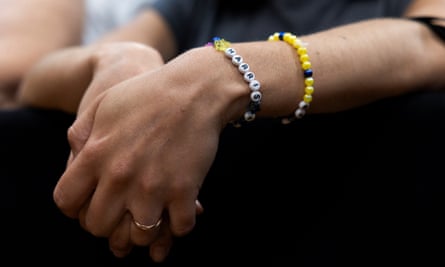When Emerald Medrano learned Joe Biden was dropping out of the 2024 presidential election and endorsing Kamala Harris as the Democratic nominee, Medrano knew he had to speak now – as his favorite artist, Taylor Swift, would say.
“I feel like us US Swifties should mass organize and help campaign for Kamala Harris and spread how horrendous Project 2025 would be to help get people’s butts down to the polls in November,” the 22-year-old posted to his 70,000 followers. He added a sobbing emoji. “Like if we don’t want democracy to end we really need to move and push blue votes.”
Fourteen thousand likes later, the coalition Swifties4Kamala was born. Dozens of people signed up to help and run accounts on X, Instagram and TikTok, as well as strategize activities and communications. Within three weeks, Swifties4Kamala amassed more than 180,000 followers across its social media platforms.
Twenty-four hours after Swifties4Kamala announced its kick-off Zoom call, scheduled for 27 August, more than 5,000 people had signed up to join, according to April Glick Pulito, the coalition’s political director.
With organizing collectives built around identities like Win With Black Women and White Dudes for Harris drawing record-breaking numbers to Zoom calls, Swifties4Kamala is built around a different kind of identity: fandom. Long dismissed as unserious, in part because it has long been thought of as the domain of women and young people, fandom is now a potent political force in the 2024 elections – an election in which young women and LGBTQ+ people are expected to vote, rally and otherwise participate in politics at historic levels.
On its social media accounts, Swifties4Kamala posts Swift-themed video edits and memes involving Harris and her running mate, Tim Walz, as well as suggested action items, such as specific organizing calls or rallies that Swifties can join. The coalition’s most recent Substack includes volunteer opportunities for phone banking and working at the polls, explanations of the proposals found in the conservative policy wishlist Project 2025, and information about down-ballot races. Naturally, each section is a reference to a different Swift lyric.
The goal is in effect twofold. First, Swifties4Kamala wants to use the decades-old Swiftie community to energize people in support of Harris. Second, they want to infuse politics with fun.

“We’re talking about throwing bracelet-making parties and talking to people there about making sure they’re registered to vote, making sure they know how to vote,” said Glick Pulito, a 36-year-old who works in political communications and worked on Biden’s 2020 campaign. “These individual identity groups that are popping up –everyone feels so excited to connect with their own communities, and the Swiftie community is so big and so powerful.”
Swifties4Kamala’s explosive growth is not only a reflection of the sheer scope of Swift’s fanbase – even before her planet-conquering Eras tour, 16% of Americans identified as “avid fans” of the singer – but also of the burgeoning political power of fandom itself. K-pop fans first proved back in 2020 that the social media skills that fuel modern fandoms, such as coordinating fundraising and ticket-scoring campaigns, could be turned towards political aims, when they claimed credit for sinking a Donald Trump rally.
Four years later, fandom has already shaped the course of the 2024 election.
Memorably, the first fandom to seize on Harris’s candidacy was not the Swifties, but the Angels, fans of the singer Charli xcx. Hours after Biden dropped out and endorsed Harris, Charli xcx tweeted: “kamala IS brat,” a reference to her album Brat and its brash party-girl aesthetic. The internet was immediately awash with green-tinted supercuts of Harris – the Brat album’s signature color – while CNN reporters tried to decode the meaning of “brat” for less online audiences at home. (“So is the idea that we’re all kind of brat and Vice-President Harris is brat?” Jake Tapper asked.) Harris’s official campaign account even changed its banner on X to brat green.
Swift’s political cachet, though, far outstrips that of Charli xcx and the Angels. In 2022, after Swift urged her millions of Instagram followers to vote, Vote.org recorded more than 35,000 voter registrations. Ticketmaster’s botched rollout of the Eras tour led to a 2023 Senate hearing. Swift’s endorsement is one of the coveted prizes in the 2024 election; although she has not said anything about this year, the odds are not looking good for Donald Trump and JD Vance. Not only did Swift endorse Democrats in 2018 and 2020, but she is also probably the world’s most famous “childless cat lady”.
after newsletter promotion
Experts told the Guardian earlier this year that Swift’s endorsement could compel people who might otherwise sit out the election to vote. Most Swifties identify as Democrats, a Morning Consult poll found last year.
Irene Kim, co-founder and senior communications director of Swifties4Kamala, expects that Swift will ultimately endorse Harris. But Kim isn’t waiting on the singer.
“I also personally resent this idea that floats around a lot, that Taylor needs to issue an order to activate the Swifties. We are a diverse group of very intelligent, very different people. We’re not mindless drones,” said Kim, 29. “These are our friends, so of course, I’m going to care if their rights are being taken away. They’re going to care if my rights are being taken away.”
“I knew I was gay from a younger age, so my life is turned into politics. I’m forced to keep up with it,” said Rohan Regan, a 21-year-old first-time voter. “I’ve attended rallies, protests, donated – but it’s never been something where I’m helping coordinate anything. It’s always like showing up in support instead of me trying to help be part of leading people.”
Now, Regan, who has 60,000 followers on his Swift-focused Instagram account, leads Swifties4Kamala’s Instagram presence. (He’s particularly proud of his “You Need to Kamala Down” video edit.) He’s more engaged in politics than he’s ever been.
“I don’t want to go back to what it was like when Trump was president,” he said. “To me, that is just not really an option.”
Source: theguardian.com

















